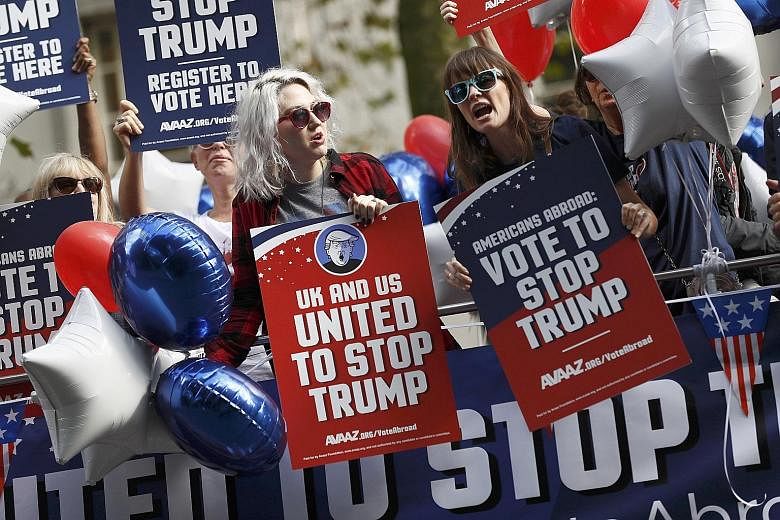For most Europeans, a victory for Mr Donald Trump in the US presidential elections would be a nightmare come true, since he seems to embody everything Europe dreads about its future, all rolled into one outsized personality.
Mr Trump's brash campaigning style and claims that just because he is a supposedly successful businessman, he can also be a great president, as well as all the props which go with him - such as his private jet, bling and the dismissive language towards his opponents - remind Europeans of their own populist politicians, now on the rise in almost every European country.
Not many European populists can boast of Mr Trump's wealth, but quite a few of those who currently challenge Europe's mainstream politics are resorting to the same campaigning techniques as his, the same appeal to emotion rather than reason, and slogans rather than facts. Should Mr Trump make it to the White House, the impact on European politics would be profound; the populists' argument would be that, if a majority of US voters can entrust their future to someone like Mr Trump, so can the Europeans.
Mr Trump's dismissal of the Europeans as ungrateful free-riders - rich nations hiding under the United States' protective umbrella rather than paying for their own defence - grates, partly because it is true, but also because it indicates a fundamental misunderstanding of the purpose and significance of Europe's transatlantic links with America.
It is highly likely that a President Trump will not carry out his electoral threat to dismantle Nato, the US-led military alliance in Europe. But the mere fact that, for the first time since World War II, a US president even raised such a possibility during his election campaign will shake the alliance to the core. So will the perception that Mr Trump cares more about Russia than about defending traditional US allies.

Transatlantic relations will nosedive. And all this will happen just as the Europeans are struggling to sustain and expand free trade relations; a worse combination of circumstances can hardly be imagined. For all these reasons, most European governments are psychologically incapable of even thinking of, let alone planning for, a Trump presidency.
Should Mrs Hillary Clinton win the elections, she can expect a warm welcome from Europeans. Her family name instinctively brings up favourable images in Europe. The nations of the Balkans on Europe's south-eastern edges are grateful to Mr Bill Clinton, her husband, for ending the wars in that region during the 1990s, while the former Soviet-controlled countries of Eastern Europe owe their membership in Nato to Mr Clinton. Europe is one continent where Mrs Clinton's past activities and connections remain an asset, rather than a liability.
The Europeans expect her to nominate a team of experienced foreign and security policy people, many of whom are already familiar with Europe's affairs. They will also expect her to take a bigger interest in Europe than President Barack Obama did; some European capitals are prophesying a "pivot" to Europe by a Clinton presidency, similar to that which Mr Obama heralded in Asia.
Still, the Europeans have three fundamental worries about a Clinton presidency.
The first concerns the new president's attitude to free trade. The assumption in Europe is that Mrs Clinton toned down her support for free trade during the electoral campaign only after she was cornered by a challenge from Mr Bernie Sanders, on the left of her Democratic party. Europeans therefore assume that her current, more circumspect attitude to free trade may just be tactical, and could be abandoned once she is in the Oval Office. But quite a few European leaders worry that the change may be more permanent, and that the anti-globalisation pressures in both the US and Europe could derail future trade agreements, a "galloping populism", as Mr Jean-Claude Juncker, president of the European Commission, recently put it.
Europeans also worry about Mrs Clinton's stance towards Russia. She is likely to adopt a tough line, if only because of allegations that Russian hackers contributed to the leaking of embarrassing material about her during the electoral campaign. Europeans welcome a more robust line on Russia, yet they worry that they may not be consulted by Washington as a new US security policy emerges.
But probably the biggest apprehension in European capitals is that Mrs Clinton's victory will not silence her domestic critics, and that a combination of accusations from Mr Trump and his supporters that the US elections were "rigged", together with the continued investigation into her e-mail scandals, may paralyse the new incoming administration and deprive Mrs Clinton of her legitimacy.
For a weak, domestically obsesses US administration could upend all transatlantic links, and will be seen in Europe as little short of a disaster.
also worry about Mrs Clinton's stance towards Russia. She is likely to adopt a tough line, if only because of allegations that Russian hackers contributed to the leaking of embarrassing material about her during the electoral campaign. Europeans welcome a more robust line on Russia, yet they worry that they may not be consulted by Washington as a new US security policy emerges.

